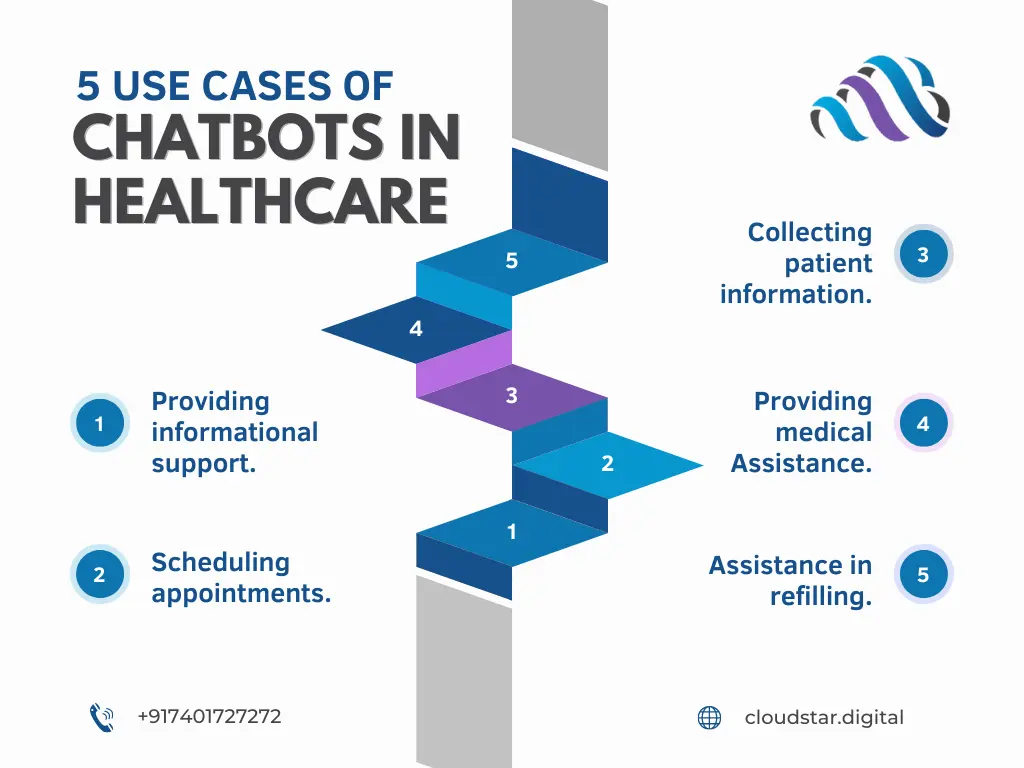In general, a chatbot is a piece of software to conduct a conversation with users via textual or auditory methods. A medical chatbot is known as an AI-powered conversational solution to facilitate the job of a healthcare provider to help the patients and healthcare companies to interact with users in a human-like way providing a seamless customer experience.
A ground-breaking role is played by a medical chatbot in synergizing front-office healthcare in streamlining the admissions, discharge, scheduling patient consultation requests, and sending or receiving referrals. Medical chatbots are programmed to facilitate collaboration among peers and update the records systems with the medical history of patients besides sending notifications and alerts for prescription refills.
Important points about medical chatbot
A medical chatbot aids the patients to fix an appointment, getting all the information, and even receiving feedback but it should consider these three essential points that include:
- User Privacy – You ought to build a standard service that can withstand cyber attacks or system errors. Besides that, you should inform your users regarding the measures you have taken to protect their personal data.
- Effectiveness – Ensure to deliver of a useful healthcare product or service without overloading the database with multiple ads and pop-up windows.
- Trustworthiness – You have to create trustworthiness by proving your medical expertise to avoid people’s bad reputations on symptoms or diagnoses.
Use cases of medical chatbots in the healthcare industry
Medical chatbots have been revolutionizing the healthcare industry by serving this industry well. Some of the healthcare chatbot use cases are:
Check Symptoms
Medical chatbots will ask for clarification of questions regarding symptoms before offering any advice. Based on the answers given by the patients, it can identify if the patient needs immediate care or just to schedule an appointment with a doctor. It transfers the script to the medical healthcare provider where the patient doesn’t have to repeat themselves.
Find Healthcare Services
Patients can easily interact with medical chatbots to get assistance from the nearest hospital or clinic. With the help of location-sharing services, it can suggest healthcare facilities available in the patient’s area and provide more information on the selected facility.

Raise Awareness
It creates awareness about a healthcare issue and provides accurate information on it. With the fast-spreading pandemic, there have been many uncertainties and misinformation, which can easily be combated using a healthcare chatbot.
Support Patients
Medical chatbots never sleep as they can provide 24/7 assistance to patients. From responding to frequently asked questions (FAQs) to connecting with a medical caregiver, chatbots help to solve the issue of providing quick customer support in the healthcare industry.
Send Reminders to Patients
Healthcare providers can use chatbots to remind patients regarding the appointments or medications as prescribed by their doctors. Chatbots are great reminders about follow-ups, re-prescription, routine check-ups, etc. to save you time from making phone calls and hospital visits.
Maintain Patient Data
Healthcare chatbots can be integrated with EMR/EHR systems to maintain the medical data of patients. Patients and nurses need not carry huge document files with them when they are meeting their doctors.
Aid in Billing and Registration
An AI-powered medical chatbot can also be used for various billing and registration processes. Starting from being admitted to a hospital to applying for insurance, these chatbots make the process simple and personalized.
Collect Feedback
Feedback is crucial for improvement. A healthcare chatbot can ask survey questions that are in an easy-to-answer format and share the details with the team.
If you seek a better chance to survive your next visit to the hospital, inform your doctor to stop wearing ties and spread the word to the other medical care providers in the hospital to start using a medical chatbot. It saves working hours and offers a quality service to the user in a cost-effective manner.
Read also: Digital Marketing for Doctors


